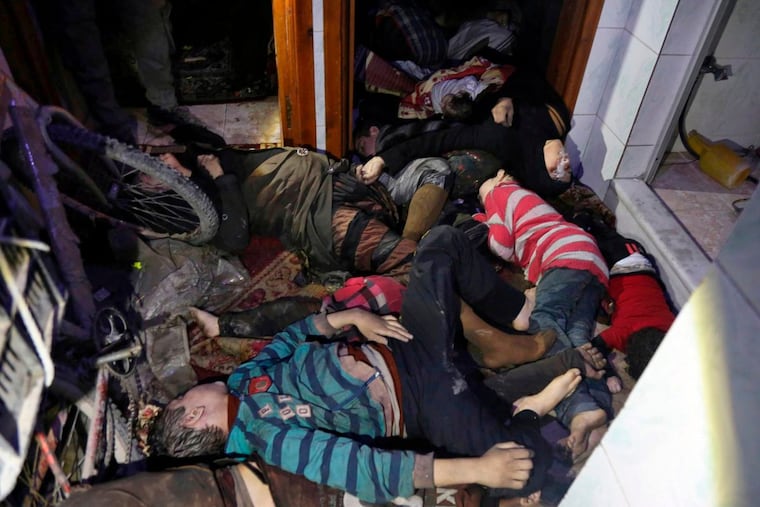Trump tweet on missile strike underscores the incoherence of his Syria policy | Trudy Rubin
The president's tweets and his pledge to pull U.S. troops out of Syria soon make any U.S. missile strike in Syria more risky.

It's hard to know where to begin when describing the incoherence of President Trump's Syria policy as he threatens missile strikes on the Assad regime.
The presidential tweet vowing an upcoming strike – which also taunted Russia's pledge to stop any missiles — was bizarre and counterproductive. "Get ready Russia, because [the missiles] they will be coming, nice and new and 'smart!" Trump couldn't resist typing.
Never mind that candidate Trump chastised Barack Obama for telegraphing U.S. military moves to the enemy by announcing plans in advance. After Trump's twitter announcement, Syria is moving key assets to safety; Russia is no doubt readying the air defenses it has installed in Syria. (And if Trump fails to strike, he will now look weak and foolish.)
Yet even more disturbing was Trump's signal last week to Russia and Iran – and Bashar al-Assad – that he wants to pull 2,000 U.S. forces out of northeast Syria in four to six months. Trump's timetable appears dictated not by U.S. security needs but by the need to satisfy a campaign promise before 2018 elections. Aware of Trump's eagerness to exit, Assad felt free to use toxic weapons.
Unless someone can inject some coherence into Trump's scattershot approach to Syria, a missile attack could do more harm than good.
Yes, there should be a response to the Syrian regime's latest hideous chemical attack on civilians in Douma. Such weapons are prohibited by international law and Russia had guaranteed that its Syrian ally had destroyed its chemical stocks.
But it's necessary to recall that the U.S. launch of 59 Tomahawk cruise missiles on Syria's Shayrat airbase a year ago, much touted as a sign of Trump's toughness, had little long-term impact on Assad's behavior. Several chlorine attacks have occurred since then.
Moreover, Assad has directly targeted hospitals and civilian neighborhoods with barrel bombs, killing hundreds of times the number who have died from chemical weapons. Yet Trump, like Obama before him, has rejected any deeper involvement in Syria, and left the field to Russia and Iran.
It is too late to revisit that policy. Supported by Moscow and Tehran, Assad is assured of power for the foreseeable future. Another one-off missile strike may persuade him to lay off the chemicals, but it won't stop the barrel bombs or the continuing slaughter of Syrian civilians.
The only hope of ending the bloodshed is at the negotiating table, where Russia has taken charge, along with Iran and Turkey – but where the United States is strikingly absent.
And the only way for the U.S. to have any leverage at the table and return the process to the original aegis of the United Nations, rather than leave it to Moscow and Tehran, is for the president to reverse his pledge on withdrawing troops.
Indeed, those troops – based mainly in the northeastern Kurdish region of Syria, known as Rojava – do more than give America some heft at negotiations. They are also helping Syrian Kurds, and some Sunni Arab tribesmen, who bore the brunt of liberating Raqqa, the capital of the ISIS caliphate. With U.S. help, they are helping clean up the last pockets of ISIS.
Even more important, continuing U.S. support in stabilizing northeast Syria is vital to prevent a resurgence of ISIS. It is also important to demonstrate that America does not callously abandon allies, like the Kurds, before there is a negotiated settlement of the Syrian civil war.
I reached the former co-president of the main Syrian Kurdish PYD political party, Salih Muslim, by phone and asked him what would be the consequence of a U.S. withdrawal within the next four to six months. He answered swiftly: "If you leave, Da'esh [the Arab acronym for ISIS] will start to appear again where the Americans are not.
"If you don't want extremists, or ISIS to return, you should keep some kind of presence [in Rojava]. We Kurds are different. Our areas are safe."
Muslim added, "If President Trump withdraws, it would be a failure for the West. It means that the Russians and Iranians would be shown to be far more effective. Also, the withdrawal of the U.S. from Rojava means that they will lose a very sincere friend." He meant the Kurds.
Unfortunately, Trump seems not to have grasped the connection between a troop withdrawal and Assad's use of chemical weapons. In a rare critique of Vladimir Putin, Trump blustered: "President Putin, Russia, and Iran are responsible for backing Animal Assad. Big price to pay."
But a one-off missile strike, or even two strikes, won't persuade Putin to stop backing Assad. Nor will such strikes prevent Tehran from trying to expand its hold on Syria, which could provoke a war between Iran and Israel. Nor will they stop Turkey from attacking America's Syrian Kurdish allies – and possibly U.S. troops. Nor will the ad hominem name-calling that Trump delights in on Twitter impress Putin or Assad.
As one-off events, missile strikes could make the Syria situation worse. They won't make it better. That would take a broad Syria policy that shows the U.S. president is serious, a policy (and a president) that we have yet to see.
trubin@phillynews.com; @trudyrubin